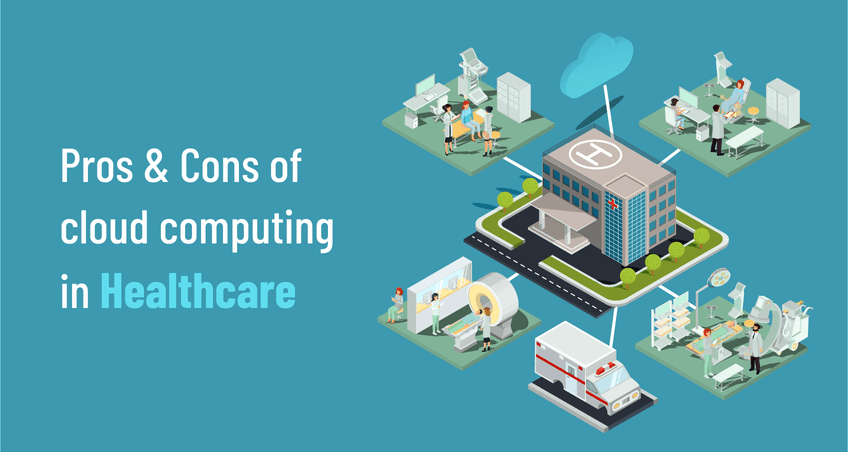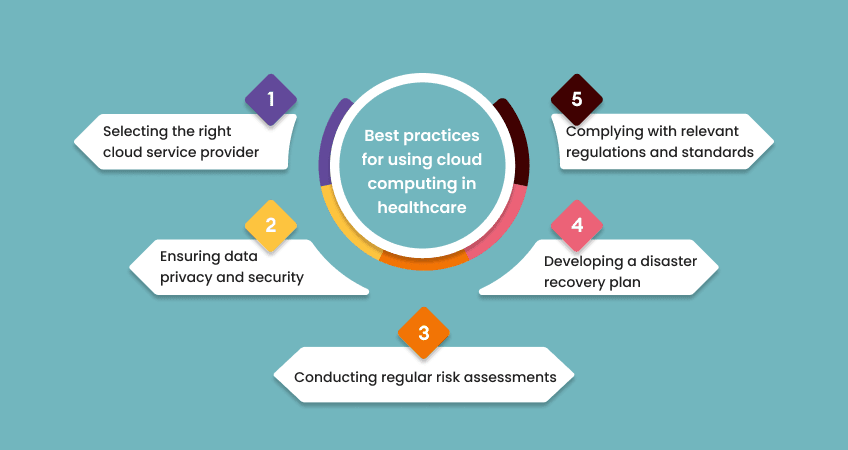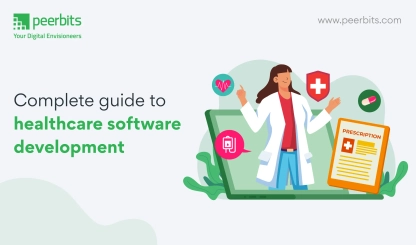0Cloud computing has become a buzzword in recent years, with its widespread adoption in various industries, including healthcare. The vast amount of data generated in the healthcare industry has made it a fertile ground for the implementation of cloud computing.
In healthcare, cloud computing stores and manages large volumes of data, such as electronic medical records (EMRs), patient data, and medical images.

In this blog post, we will explore the importance of cloud computing in healthcare, the pros and cons of cloud computing in healthcare, and discuss some best practices to use cloud computing for healthcare providers.
Let us start with the importance.
Importance of cloud computing in healthcare
Cloud computing is a revolutionary technology that has significantly impacted the healthcare industry. Its benefits are numerous, and some of them include;
- Improved collaboration and communication
- Cost savings
- Increased accessibility & flexibility
- Better data security & disaster recovery
- Scalability & Efficiency
However, understanding just the points of importance is not enough; it is crucial to delve into the intricate details of how these benefits materialize.
There are several pros and cons to using cloud technology in healthcare software development. Some of the main advantages include:
Pros of cloud computing in healthcare
The core reason for the digitalization in the healthcare industry is its unique value proposition. To explore this, we will analyze the pros of using cloud computing in healthcare.
Improved collaboration and communication
Firstly, improved collaboration and communication are some of the most significant benefits of using cloud computing in healthcare. This technology enables healthcare professionals to collaborate and communicate more effectively by providing them with unique functionality to access patient records and critical data from anywhere and at any time.
This feature not only enhances information sharing between doctors and patients but also promotes informed decision-making by healthcare professionals.
Cost savings
Secondly, cloud computing offers notable cost savings for healthcare providers. For instance, cloud-based tools eliminate the need for expensive hardware and software. This benefit prevents healthcare providers from investing money in giant and expensive hardware and software and helps them to save costs.
Additionally, the pay-as-you-go model of cloud computing ensures that healthcare providers only pay for the resources they use.
Increased accessibility and flexibility
Thirdly, cloud computing increases accessibility and flexibility for healthcare providers. Cloud-based tools allow healthcare providers to access records and critical data anytime from anywhere but should have an internet connection.
This feature enhances the accessibility of healthcare services and promotes flexibility for healthcare providers to provide care remotely and collaborate with other healthcare providers as and when necessary.
Better data security and disaster recovery
Fourthly, cloud computing offers better data security and disaster recovery for healthcare providers. Data security is a critical concern for any industry, including healthcare.
Cloud-based tools provide healthcare service providers with secure and redundant data centers where they can store patient data easily.
Additionally, this technology ensures quick and easy restoration of data in any circumstance of a disaster or system failure.
Scalability and efficiency
The mind-boggling and staggering benefit of cloud computing in healthcare industry is the unprecedented scalability and efficiency. With cloud computing, they can swiftly and smoothly scale their IT infrastructure up or down at a moment's notice.
This level of flexibility translates to a more efficient response to the constantly evolving demands of the healthcare landscape.
In addition, compared to their traditional on-premise counterparts, cloud-based solutions offer a degree of efficiency that can translate to significant savings in time and money for healthcare providers, making cloud computing a game-changer in the healthcare industry.
Did you know?
The global healthcare cloud computing market was valued at $39.4 billion in 2022 & is expected to reach $89.4 billion by 2027 at a CAGR of 17.8% from 2022 to 2027. (Source)
Cons of cloud computing in healthcare
While there are many advantages to using cloud computing in healthcare, there are also some potential drawbacks to consider. Here are some of the cons of using cloud computing in healthcare:
Privacy and security concerns
One of the primary concerns with cloud computing in healthcare is data privacy and security. Healthcare providers must ensure that patient data is protected from unauthorized access, theft, and cyber-attacks.
Additionally, healthcare providers must ensure that cloud service providers comply with all relevant data privacy and security regulations.
Dependence on technology
Using cloud computing in healthcare requires healthcare providers to be dependent on technology. This means that any downtime or service interruptions could significantly impact patient care.
Additionally, healthcare providers must ensure that they have the necessary technical expertise to manage and maintain their cloud-based tools.
Potential downtime and service interruptions
Cloud computing is not immune to downtime and service interruptions. Healthcare providers must ensure that they have a plan in place to minimize the impact of downtime on patient care.
Additionally, healthcare providers must ensure that they have the necessary technical support to quickly resolve any issues that arise.
Limited control over data management
With cloud computing, healthcare providers must rely on cloud service providers to manage and store patient data. This means that healthcare providers have limited control over data management.
Additionally, healthcare providers must ensure that they have a plan in place to retrieve their data if they decide to switch to a different cloud service provider.
Regulatory compliance challenges
Healthcare providers must comply with numerous data privacy and security regulations, such as HIPAA and GDPR. Using cloud computing in healthcare can introduce additional regulatory compliance challenges, as healthcare providers must ensure that cloud service providers comply with all relevant regulations.
Case studies
To fully comprehend the potential benefits and drawbacks of cloud computing in healthcare, it is beneficial to investigate case studies of successful and unsuccessful implementations.
Examining these examples offers valuable insights into how healthcare providers can leverage cloud computing to enhance patient care and the challenges they may face.
Successful Implementation of Cloud Computing in Healthcare
One of the most compelling examples of successful cloud computing implementation in healthcare is the University of Pittsburgh Medical Center (UPMC). By utilizing cloud-based tools, UPMC has significantly improved the management of patient data and collaboration among healthcare providers.
Clinicians can now access real-time patient information, regardless of their location, resulting in improved care quality and timeliness.
UPMC also developed predictive analytics tools, powered by cloud computing, that can identify patients at risk of complications or readmission. Early intervention by clinicians has helped to reduce readmission rates and improve patient outcomes.
Another notable success story is Athenahealth, a cloud-based electronic health record (EHR) provider that has helped healthcare providers streamline their operations and improve patient care. Athenahealth's cloud-based EHR system has shown to increase efficiency, decrease errors, and facilitate communication between healthcare providers.
Failures and Lessons Learned from Cloud Computing in Healthcare
Despite the many success stories, there have been failures and challenges associated with cloud computing in healthcare.
In 2019, a healthcare organization's use of a cloud storage provider resulted in a massive data breach, with over 1 million patient records exposed. This incident emphasizes the importance of selecting a reliable and secure cloud service provider.
Another significant challenge that healthcare organizations face is handling the complexity of the data they manage. Certain data, such as medical images and videos, require substantial bandwidth to transmit and store, resulting in high costs and slow processing times.
As a result, it is crucial to carefully evaluate the cloud computing solution and service provider to ensure they can handle the organization's unique needs.
Healthcare providers can learn from these challenges by conducting regular risk assessments, developing disaster recovery plans, and establishing rigorous data privacy and security policies. It is also vital to choose a cloud service provider carefully, monitor their security measures, and ensure they comply with regulations.
Best practices for using cloud computing in healthcare
To maximize the benefits of cloud computing while mitigating the risks, healthcare providers should follow best practices that include:

Selecting the right cloud service provider
When choosing a cloud service provider, healthcare providers should consider factors such as their experience in healthcare, data privacy and security policies, compliance with relevant regulations and standards, scalability, and reliability. It is also important to conduct due diligence on the provider's track record and performance.
Ensuring data privacy and security
Healthcare providers must ensure that their data is secure and protected when using cloud computing. This includes measures such as encrypting data, restricting access to sensitive information, and monitoring for unauthorized access or breaches.
Conducting regular risk assessments
Healthcare providers should conduct regular risk assessments to identify potential security threats and vulnerabilities. This includes identifying and assessing risks to data privacy and security, as well as risks to service availability and performance.
Developing a disaster recovery plan
Healthcare providers should have a disaster recovery plan in place to ensure that they can recover critical data and systems in the event of a disaster or service interruption. This includes regular backups and testing of the recovery plan.
Complying with relevant regulations and standards
Healthcare providers must comply with various regulations and standards related to data privacy, security, and compliance. This includes regulations such as HIPAA and GDPR, as well as standards such as ISO 27001 and NIST.
Conclusion
The transformative potential of cloud computing in the healthcare industry is vast, as it offers a host of advantages including augmented collaboration, heightened flexibility, accessibility, and bolstered data security and disaster recovery.
Nevertheless, healthcare providers need to be cognizant of the complexities and pitfalls that cloud computing may bring. These hazards include privacy and security apprehensions, heavy reliance on technology, and omnipresent regulatory compliance challenges.
Optimizing the benefits of cloud computing while diminishing the risks necessitates healthcare providers to study and replicate the lessons learned from past successful and unsuccessful implementations.
Cloud computing technology is a vital tool for advancing the healthtech industry and improving patient care. If you are looking for custom software development for healthcare industry, we can help.
Such best practices empower them to leverage the full potential of cloud computing in the healthcare industry while effectively managing its associated risks. As the healthcare industry advances, cloud computing will unquestionably play an instrumental role in catalyzing innovation and further augmenting patient outcomes.









